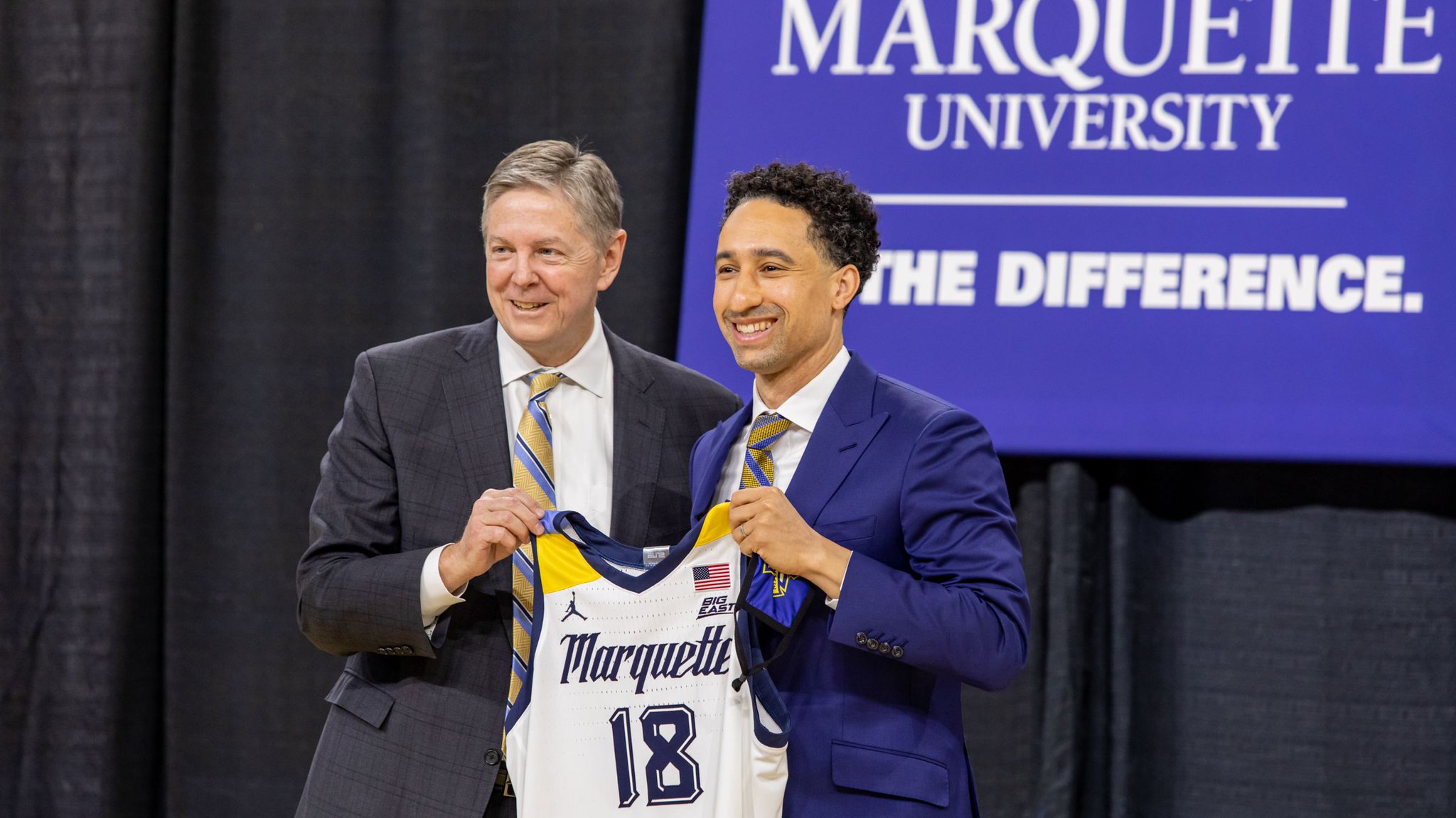Shaka Smart poses with athletic director Bill Scholl after being introduced as Marquette’s new head coach Monday. (Photo by Marquette Athletics)
By Jaden Daly (@DalyDoseOfHoops)
Immerse yourself in his contagious and infectious enthusiasm, let it envelope you in its all-encompassing grip and understand that there is more to life than just basketball, but also that the hardwood contains a philosophical and familial aspect to it that renders Marquette’s new head coach similar to the fan base he now inherits:
Hungry. Thirsty. Boundless.
Smart spoke intimately and passionately of the family atmosphere that lured him from the football hotbed of Austin and a lucrative payday at the University of Texas back to his native Wisconsin, and the excitement with which he met it Monday afternoon and pledges to uphold as he connects with the players, the fans, the community.
For that is the true ethos of Shaka, a man who thrives on cultivating and intensifying the relationships he forges with an effervescent smile and unblinking eye contact. There is a reason why Smart remembers someone forever even if he has not spoken to him or her in years, and vice versa. It was that quality that made him so widely revered in his first stop at VCU, and one that made him such an appealing choice to replace the droll and sometimes canned personality of Steve Wojciechowski.
Yet for all of Smart’s gifts and accolades, one stands out in particular, the ability to hype the tenth man in the rotation as much as the leading scorer, the ability to make every young man he is entrusted to lead feel like he matters. When VCU won the Atlantic 10 Conference championship in 2015, Smart made it a point to single out JeQuan Lewis and Doug Brooks — reserve guards who saw minimal minutes in the grand scheme of things, but in the wake of Briante Weber’s torn ACL, crucial cogs in the Ram machine — for their vitality to the program and contributions that belie the final numbers.
So how is it that a coach is able to create such a harmony within the walls of his locker room, where productivity may not matter as much as the positive energy and impact contributed? Smart gave a candid and eye-opening answer.
“That’s a great question, and it has become tougher and tougher,” he said. “I would say 25 years ago, when I was a teenager, it was more, ‘Hey, everybody, do what the coach says,’ and some guys might not like it, but if the coach says it, you went and did it.”
“It’s a different world we live in now. I think social media, the 24-hour news cycle, continuous coverage has changed things, so it’s incredibly important for guys to know and feel like they’re valued members of the team. Now, you only have 200 minutes to dole out in a regulation game.”
And how is it that a man who exudes infinite confidence can do the same with a finite number that shrinks ever so smaller in the heat of battle? Observe this glimpse into the Tao of Shaka:
“One of the exercises I do with my teams is letting the guys go up on the whiteboard and write out how many minutes they would play each guy on the team,” he revealed. “But it can only add up to 200. And it’s interesting, because you talk about games — you mentioned the A-10 championship game — anytime you’re able to do something special, inevitably, there’s a guy that maybe doesn’t have eye-popping numbers, maybe doesn’t start or even play significant minutes most games. But there’s a guy that helps you win, and that’s the unique dynamic we have in basketball.”
That innate eye for the unassuming reserve who affects the game with his intangibles was just as much a characteristic of Smart’s VCU teams as his Havoc defense, which stresses aggressive defense with disruptive pressure and a premium on forcing turnovers to get in transition and fuel the 3-point shot. But it takes a special person to recognize the dichotomy between team success and individual betterment, one Marquette now has well within its grasp, made even sweeter after waiting seven years to turn the words “done deal” from a regional punchline to a promising marriage.
“It is a consummate team game, but in so many ways, it is evaluated and even marketed at times at the highest level by the individual,” Smart cautioned. “And so our job as coaches is to deal with that kind of interplay between team sport and individual evaluation, because let’s face it: Players that are good enough to play at this level, they do have goals — individual goals — even beyond college, and that’s a good thing.”


No comments:
Post a Comment
Note: Only a member of this blog may post a comment.